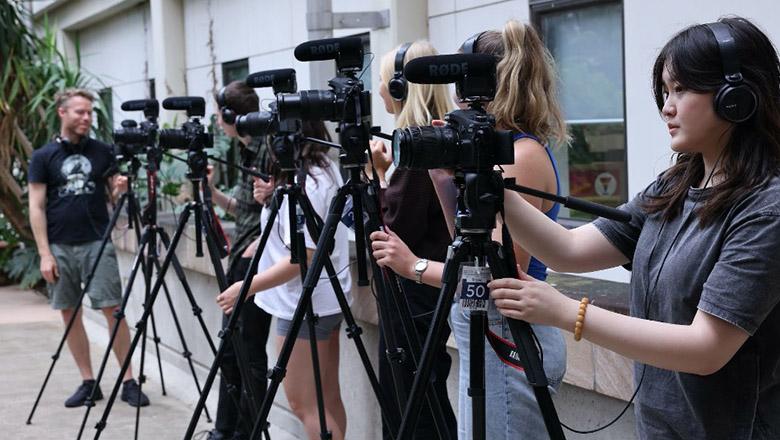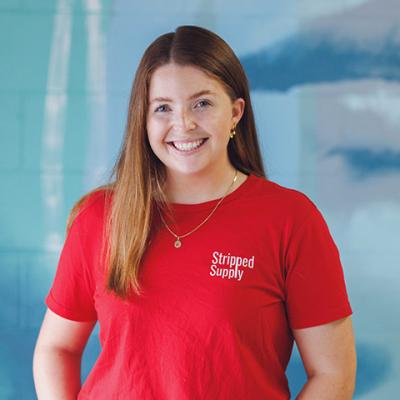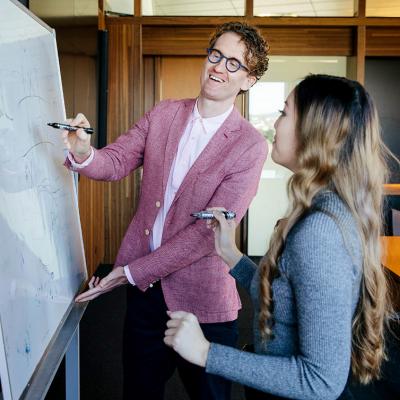Want to make your mark on the world through media? The first step is choosing where to study communication.
UQ’s Bachelor of Communication program has embraced the dramatic changes taking place in media industries, technologies and cultures. While studying communication at UQ, you’ll learn to target the right people with the right message and stay on top of an ever-shifting industry.
Read on to discover the advantages of studying communication at UQ.
Learn from industry experts
What makes UQ one of the best universities for communication studies is the opportunity to work with real organisations, hear from experts in the field and gain firsthand experience in strategic industry practice. All our courses combine practice and theory, and working with industry clients ensures you graduate with a packed portfolio, armed with the skills and knowledge to tailor your own career path.
Our students learn from professionals working in some of Australia’s leading media organisations. In the past, we’ve had guest lectures from TikTok and Hypetap, an influencer marketing agency who have worked with brands like UNIQLO and Nickelodeon.
UQ communication students have interned with Screen Queensland, Brisbane Writers Festival, QPAC, The Urban List and Paralympics Australia, to name a few. You could find yourself interning with prominent Brisbane-based or Australian brands such as these. For those looking for opportunities further afield, international internships are also available, as are short-term or semester-long study abroad experiences.
Learn more about undertaking an internship, field trip or placement with UQ’s School of Communication and Arts.

Get dedicated media and production support
The best universities for communication and media studies help you develop your digital skills and train you to use programs and tools common in content production. UQ does this through our Media and Production Support (MaPS) team.
The MaPS team holds workshops on video production and editing, audio recording, print design, image editing and photography foundations. They’ll even teach you how to publish your online portfolio using WordPress and help you become an Adobe Creative Cloud pro.
You can also hire professional production equipment and book studio spaces and recording booths through JACtech, which is a service run specifically for journalism and communication students. This means you can borrow Canon DSLR cameras, tripods and audio recorders for your assignments and projects, after completing the relevant training to learn how to use them.
The MaPS and JACtech teams provide ongoing support to help students with any range of challenges, from exporting a video to editing a podcast.
UQ also has a range of industry-level facilities you can use for assignments, projects and practice, including a digital radio studio and control room, and a video production studio and post-production suite

Graduate prepared for the evolving media landscape
The ways we communicate are constantly evolving. What was once expressed through static cave drawings can now be communicated via catchy dances on TikTok or with the assistance of generative AI.
UQ’s Bachelor of Communication looks at trends of the past to help you prepare for changing methods of communication in the future. You’ll learn about not only how to communicate, but when and to who. By the end of your degree, you’ll know how to cut through the noisy media landscape to get the right message to the right people in the most convincing way.
As a UQ communication student, you won’t shy away from new technology; you’ll learn to embrace it and experiment with it. You’ll have the chance to make content using AI and analyse social media algorithms to determine the best way to reach target audiences.
Even though you’ll have plenty of opportunities to engage with the latest technology, you’ll also learn solid foundational skills that will help you navigate the exciting new media platforms that will inevitably emerge during your career as a communications professional.
For Bachelor of Communication graduate Kirra Organ, this learning approach has helped her thrive in the industry and secure a role as a content specialist at BCU Bank and P&N Bank.
"From content curation and creation, to understanding and interpreting social media analytics, my day-to-day work involves undertaking a dynamic mix of tasks while understanding how my work outputs can effectively communicate to a range of audiences with different backgrounds,” she says.
Tailor your studies to your interests
Throughout your studies, you’ll get to choose from a wide variety of classes and develop skills in areas you’re interested in pursuing – like public relations, social media, and social change. You have the flexibility to structure your program to specialise in one area of communication or gain skills and knowledge in several.
In the Bachelor of Communication, you can choose to major in Strategic Communication or Digital Media and study up to 2 of the following minors:
There’s also an array of fun and fascinating electives on offer, including:
- Gaming cultures
- Photography from the Daguerreotype to Instagram
- Writing the genre novel: heroes, lovers and monsters
- Film and game music
We offer communication as a dual degree combined with journalism, business management and arts, should you want to broaden your skills even further and enhance your employability.
Ashley Hanger, UQ graduate and founder of Stripped Supply, Australia’s first diabetes subscription box, used her dual degree in communication and journalism to make life simpler for people with diabetes.
“Sometimes it takes a fresh set of eyes to innovate an industry in a way that better supports millions of Australians, and that’s what I wanted to achieve with Stripped Supply,” she says.
“Having a degree in communication has supported me in ways I couldn’t have imagined.”
Check out the emerging careers in the arts and communication industries and thrive in a field you are passionate about.
Develop skills that span industries
Studying communication at UQ doesn’t only prepare you to work in media agencies. Effective communicators are needed in all industries, so you could find yourself leading communications strategies in health, education, social justice, conservation, research and more.
You’ll learn how to translate complicated information into simple messages for a variety of audiences, and to do this, you’ll need to work with individuals from varying backgrounds and professions. This is why UQ’s Bachelor of Communication has a strong focus on teamwork.
During your studies, you’ll undertake group projects focused on generating creative solutions to common challenges faced in the industry. In the course Issues and Stakeholder Engagement, we get professionals from the Brisbane Airport Corporation to set teams of students the task of responding to a simulated crisis to ensure effective communication results in a safe response.
By working as a team with a variety of individuals with different skill sets, you can prepare for a dynamic career spanning industries.
Explore UQ’s Bachelor of Communication to discover more reasons it should be your first QTAC preference.







